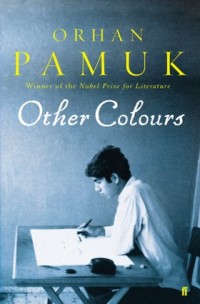The world is bathed in the colour of heat
 Other Colours: Writings on Life, Art, Books and Cities
Other Colours: Writings on Life, Art, Books and Cities
by Orhan Pamuk
translated from Turkish by Maureen Freely
I completely fell in love with Pamuk’s novel Snow when it came out so when I saw he had a new book out I snapped it up before realising that it was a collection of his essays. And then it sat on the shelf unread for five or six years. Ahem.
Pamuk’s writings as collected here are…varied, from a light-hearted series written as a regular newspaper column to serious literary analysis and his Nobel Prize speech. And my enjoyment of them was pretty varied too. The short pieces from the newspaper column were sweet, brief pithy observations about life but the longer essays tended to get a bit bogged down with either name-dropping all the classic authors he’s read or talking at length about being a bestselling author – which I couldn’t help but find big-headed. Perhaps it’s a cultural thing.
“We see things and we don’t. The world is bathed in the colour of heat, and in our minds we can see this too.”
Pamuk is an interesting man with an interesting life, but perhaps a little repetitive even when I spread my reading of this book out over three or four months. There was lots of theorising about East versus West and Turkish politics, which I liked, plus backgrounds to most of his books, e.g. months spent in Kars while writing Snow, which is naturally interesting to any fan.
“To those viewing them from the outside, one city can seem much like the next, but a city’s collective memory is its soul, and its ruins are its most eloquent testimony.”
One of my problems with this book is that Pamuk does that thing when talking of being a writer: he generalises that all writers must be this way or feel this way. Why? Are there not many thousands of writers producing very different work from very different backgrounds? Can they maybe not have very different personalities and motivations too?
“The stones we writers use are words. As we hold them in our hands, sensing the ways in which each of them is connected to the others, looking at them sometimes from afar, sometimes almost caressing them with our fingers and the tips of our pens, weighing them, moving them around.”
(I should note that the above quote is not one I consider over-generalised. I quite like this phrasing. It’s more the stuff about working methods and personality type that wound me up.)
On the other hand Pamuk is a gifted writer, with great skill at bringing scenes, real or imagined, to life, and I still intend to read more of his fiction. (In fact, this book did include one short story, which was very good.) But I might give any future essay collections of his a miss.
Published 2007 by Faber & Faber.
Source: I honestly don’t remember.
Challenges: This counts towards the 2013 TBR Pile Challenge.
I just bought Snow on impulse from a local charity shop not having read anything by Pamuk so far. But I keep hearing good things about him …..
Karen I loved Snow, though it was a slow read for me. I hope you enjoy!